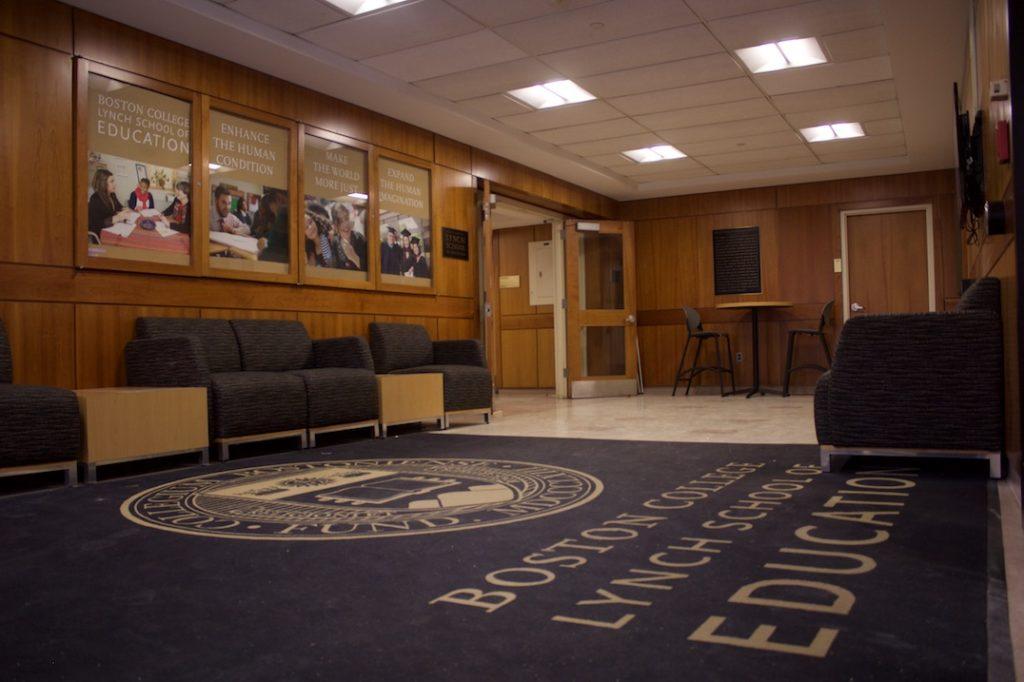The Lynch School of Education and Human Development launched its first two online degree programs in January—a master’s program in educational leadership and policy and another in global perspectives: teaching, curriculum and learning environments.
Both programs consist of 10 three-credit courses, which most students will complete within two years. Students can begin the programs in the fall, spring, or summer semesters.
Susan Bruce, the program coordinator for the global perspectives program, said that the program partly grew out of concerns faculty and students had about increasing nationalism in the United States. Many were worried that many Americans were thinking too much about their own concerns and not enough about how their actions affected people in other countries.
Students and faculty, she said, were also expressing a desire to reach learners across the globe and to hear non-American and Euorpean voices in their readings, discussions, and curriculum.
“We also were asked by our new dean at the time, Stanton Wortham, to really engage in some innovation and to think more expansively about what we do in the Lynch School,” Bruce said.
In response, Lynch built the global perspectives program—which did not already exist as a face-to-face program—entirely from scratch, with support from the Center for Teaching Excellence.
The program consists of three parts: Students learn how to create curricula with a more global perspective, teach diverse groups of learners in a manner that maximizes their life opportunities, and create learning environments that are conducive to students, according to Bruce.
“Each of these things obviously are connected to one another,” Bruce said. “When you look at the different courses, greater emphasis might be on curriculum in one … and teaching might be emphasized more and another.”
The program also benefits on-campus students, Bruce said, because students in the Curriculum and Instruction master’s degree program can take two courses in the online global perspectives program.
Unlike global perspectives, educational leadership and policy already existed in the Lynch School as a face-to-face program, but now students can complete the program entirely online or with a combination of online and face-to-face classes.
The program is aimed at people in or aspiring to be in school leadership roles, as well as those who are working in non-profit agencies that deal with education or educational policy, according to Martin Scanlan, the program director.
Lynch wanted to put the educational leadership and policy program online in order to broaden its outreach and reach an audience of students that was more diverse racially, socioeconomically, and linguistically, Scanlan said.
“A lot of times providing access in an online venue breaks down some barriers to people, so they don’t have to come into class here,” he said. “A lot of people who are taking the courses in our program are teachers in schools and are working full time, and so physically coming in to BC is an added barrier to those students.”
Both BC alumni and students who live in other countries have enrolled in the new online programs in Lynch, according to Bruce and Scanlan. Putting the educational leadership and policy program online has also led to increased proportions of Asian, African American, Hispanic, and Native Hawaiian or Pacific Islander students taking the course, Scanlan said.
Both programs require students to work on real projects in their communities and allow for students to interact with one another and their professors through technologies, such as interactive discussion boards and Zoom calls.
“That’s tricky to do across time zones, but people are getting up at unusual times … and we’re working it out,” Scanlan said.
Scanlan recalled a conversation he had with a BC alumna who now works at Harvard and is taking an online class through the Lynch School.
“She said to me, ‘Martin, my online class, it’s one of the most engaging classes I’ve ever had, compared to even my face-to-face classes, because you have to do so much all the time in the online [class], it forces you to actually engage in a way that I didn’t expect,’” he said.
Nineteen students have started the online global perspectives program, while 51 have started the online or hybrid educational leadership and policy program.
Scanlan emphasized that Lynch has a mission of creating a more just and humane world.
“We’re very mission-focused in education, and I feel like that has been central in our online program, and that’s something that we feel very, very strongly about,” he said.
Featured Image by Hannah Ervey / For The Heights



















